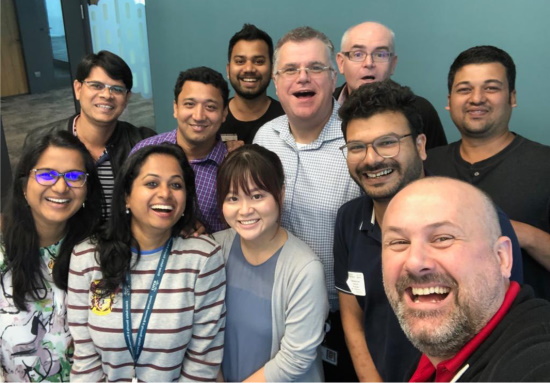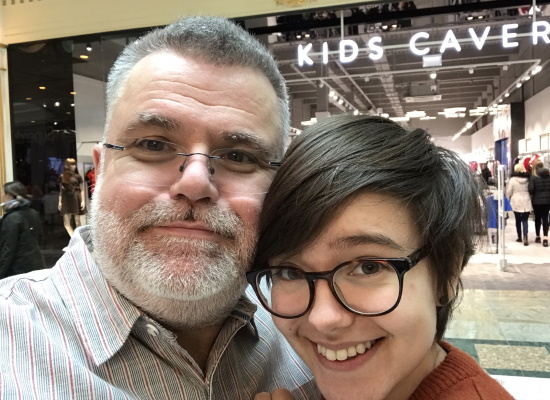2021-January-06
Did you know? You can share this story using the social media icons on the upper left. Use the hashtag #WeAreCisco. You can also rate or comment on the story below.
It’s OK Not to Be OK
BY DAVID SALTER · SENIOR MANAGER CS CSS ENGINE TEAM · UNITED KINGDOM
WITH HELEN GALL
Editor’s Note: The following story involves a discussion about mental health, including suicide, which might be upsetting to some readers.
What happens after an awareness month is over? What about the rest of the year — does mental health continue to really matter?
As someone who has been diagnosed with clinical depression, I can tell you the answer is yes.
I describe myself as a “high-functioning depressive” because I hide the turmoil inside me, like many others who struggle.
Life Wasn’t Always This Way
When I received my diagnosis in my late 20s, I was married with two young children and a high-pressure job that kept me away from home way too much.
I reached a point when something had to give — and it was me. I came out of a meeting with my psychiatrist with a new appreciation for words like “depression” and “anxiety”, followed by the reality of living with clinical depression.
After decades of struggling and a couple of job changes, I found myself at Cisco leading the Customer Success organization for Stealthwatch across EMEAR and APJC. Like some employees who join large companies, I feared I might be treated as a number rather than a name or a face, but that never happened.
In fact, it’s quite the opposite. The support and acceptance I feel at Cisco have kept me going through even the darkest of times.

One simple yet powerful phrase can sum up my Cisco journey, “We’ve got your back.”
Two years after I joined Cisco as a people leader on the Stealth Watch Customer Success team, my mother fell ill and passed away in April 2019. I was exhausted, both physically and mentally, and I lost control of my illness.
My wife forced me to see my doctor, who advised that I rest, go back on medication, and seek help from a psychologist to help cope with my grief. I needed to rebuild my resilience and take time away from work to face my depression.
At the thought of taking time off, I started to panic. Self doubt and questions filled my head. Would my team succeed without me? What would my manager think? How would this affect my career? Would I lose my job?
I had no reason to worry. When I spoke to my manager, what I heard was, “Don’t worry, we’ve got your back.” My questions faded when I knew my team and Cisco understood I needed to focus on myself.
I took three months off and worked with my manager on a plan to return to work. We agreed to gradually increase my hours from 1-2 mornings per week to a near-normal week over six weeks.
“Don’t Worry” Wasn’t Just Words
It was a promise. As someone explained to me, “Through all the years you’ve stepped up, worked late, spent weeks on the road away from your family, it’s our turn to pay you back.”
At the end of 2019, a few weeks after I returned to work. My youngest child — my only daughter — was admitted to the hospital.
Like me, she had been hiding some horrendous challenges she’d been facing. Now she was a voluntary patient in a psychiatric hospital — a four-hour drive away from home.
It was a very dark few months with my daughter staying in the hospital over the Christmas holiday. Again, my team supported me, “We are here when you need us. We’ve got your back.”
I drew strength from my colleagues’ kind hopes and thoughts. I was able to return the following spring. But again, life took a turn.
Life-Changing Loss

On April 30, 2020, after she was discharged from the hospital into my care — the day after her 18th birthday — my daughter Emma took her own life.
At that point, a part of me wanted to give up. But my family and my Cisco family rallied around me. Again, I had to take more time away from work.
I am not the same person that I was two years ago. The loss I suffered has changed me, but I want to share five important things I learned:
- You are not alone.
- Nobody has the right to judge you.
- “No” is a word we don’t use often enough. Don’t be afraid to use it.
- Remember that you and your loved ones always take priority over work.
- Fellow people leaders: Trust your staff and nurture them.
Whatever challenges you face, a truly great team will step up. Share your story and create a team environment built on trust, honesty, and collective values.
I’ve been back at work for over four months. The ongoing support I receive exemplifies why Cisco is such a great place to work.
So, does mental health awareness really matter?
It does.
And the benefits ripple throughout our company through awareness programs, support networks, and more. Take advantage of the services made available to you when you are ready. In my experience, the support you receive will help beyond measure.
We all have mental health. So, let's talk about it. No judgment. Just support.
Related Links
Connect everything. Innovate everywhere. Benefit everyone.
Share your thoughts!
Log in to rate and commentShare your thoughts on the story here!